最新中考初中英语句子种类专项复习及解析
最新中考初中英语句子种类专项复习及解析
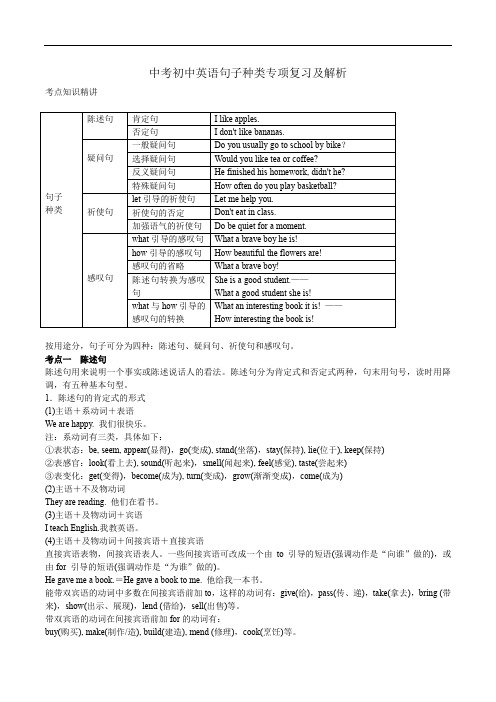
中考初中英语句子种类专项复习及解析考点知识精讲按用途分,句子可分为四种:陈述句、疑问句、祈使句和感叹句。
考点一陈述句陈述句用来说明一个事实或陈述说话人的看法。
陈述句分为肯定式和否定式两种,句末用句号,读时用降调,有五种基本句型。
1.陈述句的肯定式的形式(1)主语+系动词+表语We are happy. 我们很快乐。
注:系动词有三类,具体如下:①表状态:be, seem, appear(显得),go(变成), stand(坐落),stay(保持), lie(位于), keep(保持)②表感官:look(看上去), sound(听起来),smell(闻起来), feel(感觉), taste(尝起来)③表变化:get(变得),become(成为), turn(变成),grow(渐渐变成),come(成为)(2)主语+不及物动词They are reading. 他们在看书。
(3)主语+及物动词+宾语I teach English.我教英语。
(4)主语+及物动词+间接宾语+直接宾语直接宾语表物,间接宾语表人。
一些间接宾语可改成一个由to引导的短语(强调动作是“向谁”做的),或由for 引导的短语(强调动作是“为谁”做的)。
He gave me a book.=He gave a book to me. 他给我一本书。
能带双宾语的动词中多数在间接宾语前加to,这样的动词有:give(给),pass(传、递),take(拿去),bring (带来),show(出示、展现),lend (借给),sell(出售)等。
带双宾语的动词在间接宾语前加for的动词有:buy(购买), make(制作/造), build(建造), mend (修理),cook(烹饪)等。
My mother bought me a present.=My mother bought a present for me.我妈妈给我买了件礼物。
初中英语句子种类专项复习及解析

初中英语句子种类专项复习及解析以下是初中英语常见句子种类的复习和解析:1.简单句:由主语和谓语构成的句子。
例句:She is my sister.(她是我妹妹。
)2.复合句:由一个主句和一个或多个从句构成的句子。
3.并列句:由两个或多个同级的主句组成的句子,它们之间用连词连接。
例句:I like pizza, but my sister prefers pasta.(我喜欢披萨,但我妹妹更喜欢意大利面。
)4.疑问句:用来询问信息的句子。
5.肯定句:陈述一个事实或表示同意的句子。
例句:She is a good student.(她是一个好学生。
)6.否定句:否定一个事实或表示不同意的句子。
例句:He didn't pass the exam.(他没有通过考试。
)7.条件句:表示其中一种情况发生时,会发生的结果。
例句:If it rains, we will stay at home.(如果下雨,我们会呆在家里。
)8.祈使句:表示请求、命令、建议的句子。
例句:Please close the door.(请关上门。
)9.感叹句:表示强烈感情或观点的句子。
例句:What a beautiful flower!(多么漂亮的花!)10.直接引语和间接引语:直接引语是直接引述他人的话;间接引语是将他人的话改为自己的话。
例句:直接引语:He said, "I am tired."(他说:“我累了。
”)例句:间接引语:He said that he was tired.(他说他累了。
)以上是初中英语句子种类的复习和解析,希望能帮到你。
中考英语重点句型讲解和例句分析
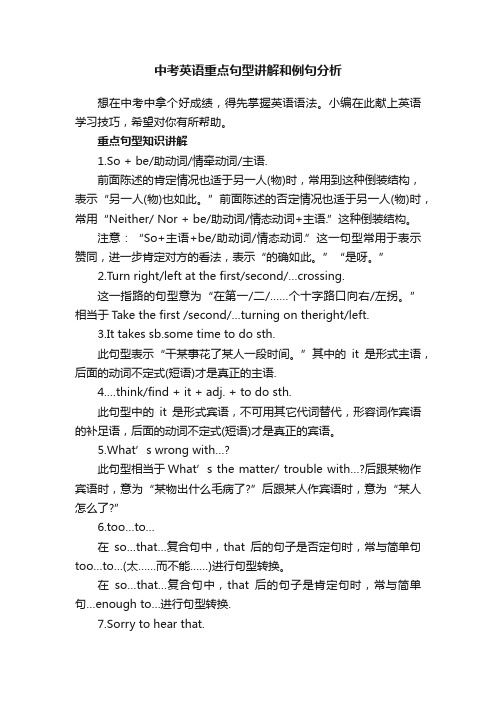
中考英语重点句型讲解和例句分析想在中考中拿个好成绩,得先掌握英语语法。
小编在此献上英语学习技巧,希望对你有所帮助。
重点句型知识讲解1.So + be/助动词/情牵动词/主语.前面陈述的肯定情况也适于另一人(物)时,常用到这种倒装结构,表示“另一人(物)也如此。
”前面陈述的否定情况也适于另一人(物)时,常用“Neither/ Nor + be/助动词/情态动词+主语.”这种倒装结构。
注意:“So+主语+be/助动词/情态动词.”这一句型常用于表示赞同,进一步肯定对方的看法,表示“的确如此。
”“是呀。
”2.Turn right/left at the first/second/…crossing.这一指路的句型意为“在第一/二/……个十字路口向右/左拐。
”相当于Take the first /second/…turning on theright/left.3.It takes sb.some time to do sth.此句型表示“干某事花了某人一段时间。
”其中的it是形式主语,后面的动词不定式(短语)才是真正的主语.4.…think/find + it + adj. + to do sth.此句型中的it是形式宾语,不可用其它代词替代,形容词作宾语的补足语,后面的动词不定式(短语)才是真正的宾语。
5.What’s wrong with…?此句型相当于What’s the matter/ trouble with…?后跟某物作宾语时,意为“某物出什么毛病了?”后跟某人作宾语时,意为“某人怎么了?”6.too…to…在so…that…复合句中,that后的句子是否定句时,常与简单句too…to…(太……而不能……)进行句型转换。
在so…that…复合句中,that后的句子是肯定句时,常与简单句…enough to…进行句型转换.7.Sorry to hear that.全句应为I’m sorry to hear that. 意为“听到此事我很难过(遗憾)。
中考英语五大句型及句子种类专项讲解及练习(附答案)

简单句考试要求:简单句的五种基本句型及There be句型是英语学习的基础和重点,也是中考试卷的重点,在书面表达、句子改写和翻译句子中都经常考查有关句子的知识;感叹句、疑问句、祈使句更是单项选择和句型转换的重点。
1.简单句的句型简单句就是句子只有一个主语和谓语,有五种基本句型:(1)主语+谓语:这种句型称为主谓结构(S+V),其谓语一般是不及物动词。
例如:The rain stopped. 雨停了。
Things have changed now. 现在事情发生了变化。
(2)主语+连系动词+表语:这种句型称为主系表结构(S+L+P),连系动词在形式上也是一种谓语动词,表语一般是名词或者形容词。
例如:His father is a teacher. 他的爸爸是老师。
(表语是名词)Your mother is very young. 你的妈妈很年轻。
(表语是形容词)(3)主语+谓语+宾语:这种句型称为主谓宾结构(S+V+O),其谓语动词是及物动词,宾语一般是直接宾语。
例如:They often speak English at the meeting. 他们在会上经常说英语。
The house caught fire. 房子着火了。
(4)主语+谓语+间接宾语+直接宾语:这种句型称为主谓宾宾结构(S+V+O+O),其谓语动词必须是可以跟双宾语的动词,两个宾语中表示事物的是直接宾语,另一个表示人的是间接宾语。
例如:My father gave me a pen last night. 昨天晚上我爸爸给我一支钢笔。
I will write you a letter when I get there. 我到那里儿时给你写信。
(5) 主语+谓语+宾语+宾语补足语:这种句型称为主谓宾及宾补结构(S+V+O+C)其谓语动词必须是可以跟复合宾语的及物动词。
例如:I find him very clever. 我发现他很聪明。
中考英语总复习 专题十二 句子的种类(语法专项突破+系统梳理+提升演练)(含解析) 人教新目标版
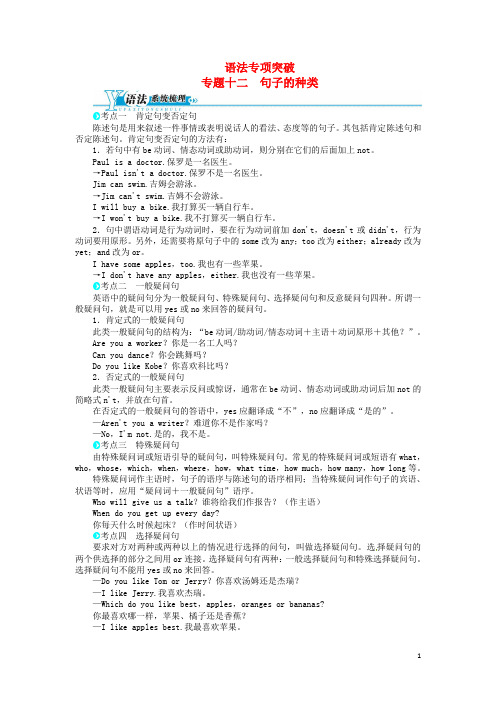
语法专项突破专题十二句子的种类考点一肯定句变否定句陈述句是用来叙述一件事情或表明说话人的看法、态度等的句子。
其包括肯定陈述句和否定陈述句。
肯定句变否定句的方法有:1.若句中有be动词、情态动词或助动词,则分别在它们的后面加上not。
Paul is a doctor.保罗是一名医生。
→Paul isn't a doctor.保罗不是一名医生。
Jim can swim.吉姆会游泳。
→Jim can't swim.吉姆不会游泳。
I will buy a bike.我打算买一辆自行车。
→I won't buy a bike.我不打算买一辆自行车。
2.句中谓语动词是行为动词时,要在行为动词前加don't,doesn't或didn't,行为动词要用原形。
另外,还需要将原句子中的some改为any;too改为either;already改为yet;and改为or。
I have some apples,too.我也有一些苹果。
→I don't have any apples,either.我也没有一些苹果。
考点二一般疑问句英语中的疑问句分为一般疑问句、特殊疑问句、选择疑问句和反意疑问句四种。
所谓一般疑问句,就是可以用yes或no来回答的疑问句。
1.肯定式的一般疑问句此类一般疑问句的结构为:“be动词/助动词/情态动词+主语+动词原形+其他?”。
Are you a worker?你是一名工人吗?Can you dance?你会跳舞吗?Do you like Kobe?你喜欢科比吗?2.否定式的一般疑问句此类一般疑问句主要表示反问或惊讶,通常在be动词、情态动词或助动词后加not的简略式n't,并放在句首。
在否定式的一般疑问句的答语中,yes应翻译成“不”,no应翻译成“是的”。
—Aren't you a writer?难道你不是作家吗?—No,I'm not.是的,我不是。
初中英语2024届中考句子成分专项练习(基础巩固+难点突破)(附参考答案)
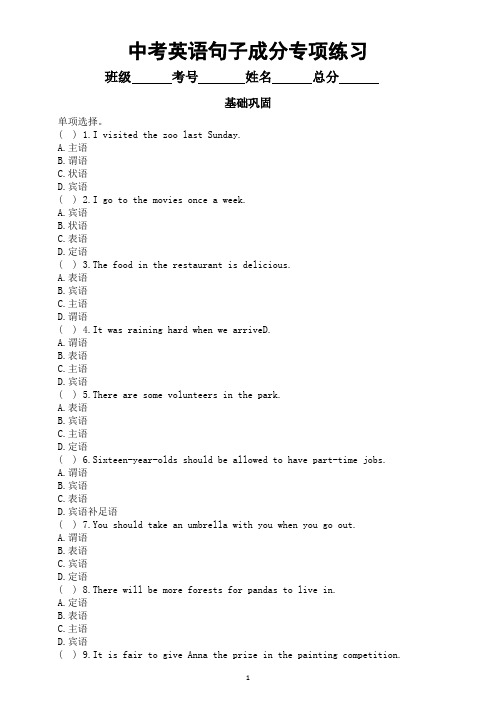
中考英语句子成分专项练习班级考号姓名总分基础巩固单项选择。
( ) 1.I visited the zoo last Sunday.A.主语B.谓语C.状语D.宾语( ) 2.I go to the movies once a week.A.宾语B.状语C.表语D.定语( ) 3.The food in the restaurant is delicious.A.表语B.宾语C.主语D.谓语( ) 4.It was raining hard when we arriveD.A.谓语B.表语C.主语D.宾语( ) 5.There are some volunteers in the park.A.表语B.宾语C.主语D.定语( ) 6.Sixteen-year-olds should be allowed to have part-time jobs.A.谓语B.宾语C.表语D.宾语补足语( ) 7.You should take an umbrella with you when you go out.A.谓语B.表语C.宾语D.定语( ) 8.There will be more forests for pandas to live in.A.定语B.表语C.主语D.宾语( ) 9.It is fair to give Anna the prize in the painting competition.A.形式主语B.直接宾语C.间接宾语D.真正主语( ) 10.I bought my mother some flowers on Mother's Day.A.直接宾语B.间接宾语C.表语D.状语( ) 11.The accident____on the morning of last Monday.A.was happenedB.was taken placeC.took placeD.happening( )12.Going hiking with a group of people makes me___.A.relaxingB.to relaxC.relaxD.have relaxed( ) 13.The house belongs to Mr Smith, but he__here any more.A.hasn't livedB.didn't liveC.wasn't livingD.doesn't live( ) 14.-I'm thirsty now.Could I have___hot water?-OK.Here you are.A.anyB.someC.littleD.no( )15.-When is the speech contest?-Oh.___Friday, September 29th.A.They'reB.It'sC.I'mD.She's难点突破一、单项选择。
2023年中考英语总复习初中英语语法知识十三大专题复习讲义及习题(精编版)
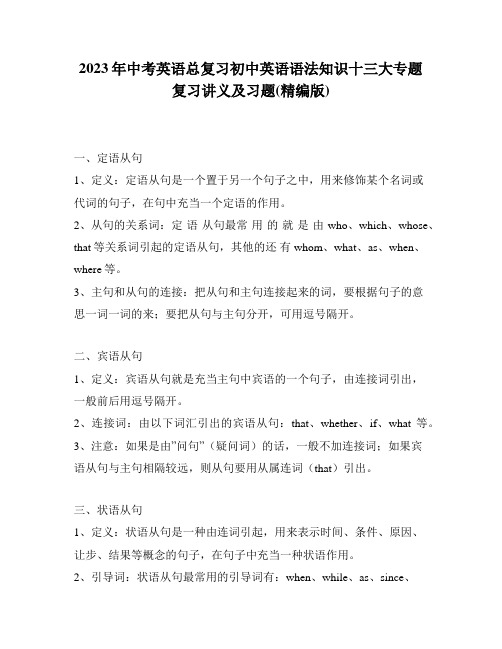
2023年中考英语总复习初中英语语法知识十三大专题复习讲义及习题(精编版)一、定语从句1、定义:定语从句是一个置于另一个句子之中,用来修饰某个名词或代词的句子,在句中充当一个定语的作用。
2、从句的关系词:定语从句最常用的就是由 who、which、whose、that等关系词引起的定语从句,其他的还有 whom、what、as、when、where等。
3、主句和从句的连接:把从句和主句连接起来的词,要根据句子的意思一词一词的来;要把从句与主句分开,可用逗号隔开。
二、宾语从句1、定义:宾语从句就是充当主句中宾语的一个句子,由连接词引出,一般前后用逗号隔开。
2、连接词:由以下词汇引出的宾语从句:that、whether、if、what等。
3、注意:如果是由”问句”(疑问词)的话,一般不加连接词;如果宾语从句与主句相隔较远,则从句要用从属连词(that)引出。
三、状语从句1、定义:状语从句是一种由连词引起,用来表示时间、条件、原因、让步、结果等概念的句子,在句子中充当一种状语作用。
2、引导词:状语从句最常用的引导词有:when、while、as、since、until、before、after、if、whether、because等。
3、务必注意:时间、地点、条件状语从句切忌混淆,要分清才可正确运用。
四、名词性从句1、定义:名词性从句又称为词性的从句,是一个句子充当主句中的一个名词,它可单独作句子的主语,宾语或表语。
2、从句的连接词:要表达名词性从句的概念,最常采用的就是由关系代词(who, whom, which, that等)、关系副词(when, where, why, how 等)以及由从属连词(if, whether等)引起的名词性从句。
3、注意事项:将其从名词性从句区分开来可用逗号隔开;也要注意主句和从句之间的位置关系,情况不同,连接词可以不同。
五、简单句1、定义:简单句也叫单个句子,是由一个主语和一个谓语动词构成的一句话;当主语是第一人称或三单时,句尾不加to。
中考英语强调句型专项及解析(1)
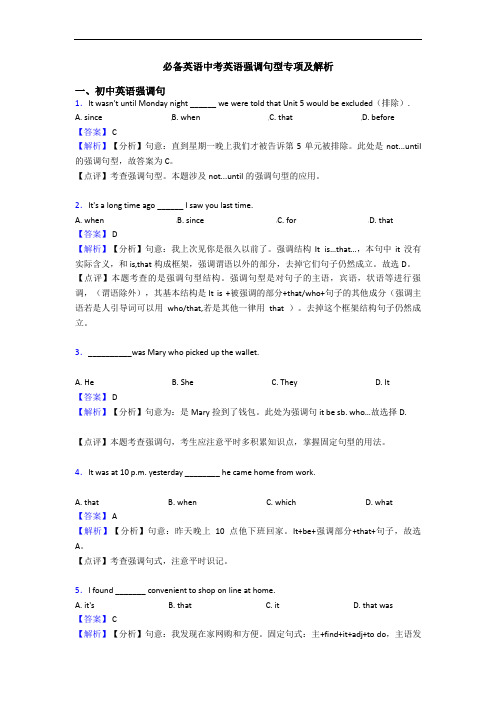
必备英语中考英语强调句型专项及解析一、初中英语强调句1.It wasn't until Monday night ______ we were told that Unit 5 would be excluded(排除).A. sinceB. whenC. thatD. before【答案】 C【解析】【分析】句意:直到星期一晚上我们才被告诉第5单元被排除。
此处是not...until的强调句型,故答案为C。
【点评】考查强调句型。
本题涉及not...until的强调句型的应用。
2.It's a long time ago ______ I saw you last time.A. whenB. sinceC. forD. that【答案】 D【解析】【分析】句意:我上次见你是很久以前了。
强调结构It is…that…,本句中it没有实际含义,和is,that构成框架,强调谓语以外的部分,去掉它们句子仍然成立。
故选D。
【点评】本题考查的是强调句型结构。
强调句型是对句子的主语,宾语,状语等进行强调,(谓语除外),其基本结构是It is +被强调的部分+that/who+句子的其他成分(强调主语若是人引导词可以用who/that,若是其他一律用that )。
去掉这个框架结构句子仍然成立。
3.__________was Mary who picked up the wallet.A. HeB. SheC. TheyD. It【答案】 D【解析】【分析】句意为:是Mary捡到了钱包。
此处为强调句it be sb. who…故选择D.【点评】本题考查强调句,考生应注意平时多积累知识点,掌握固定句型的用法。
4.It was at 10 p.m. yesterday ________ he came home from work.A. thatB. whenC. whichD. what【答案】 A【解析】【分析】句意:昨天晚上10点他下班回家。
句子的种类知识点详解(初中英语专项复习)3

句子的种类知识点详解(初中英语专项复习)句子类型分为4种:在中考题型中,感叹句和疑问句考得最多。
特别疑问句,疑问词的用法是最重要的考题之一。
【典例】1. 他们还赢得了广东省飞镖比赛冠军。
多么棒的项目啊!They won the Championship of Guangdong Darts Match, too. ________________________ project it is!【答案】What a wonderful【解析】根据题干可知此处是一个感叹句。
中心词为可数名词project“项目”,符合结构:What+ a/an+形容词+主语+谓语。
project是以辅音音素开头,应用a;wonderful“极好的”。
故填What a wonderful。
2.. ________ it was to see the main sights of the world in the World Park!A How amazing day B. How an amazing dayC. What amazing dayD. What an amazing day【答案】D【解析】句意:在世界公园里看到世界的主要景点是多么美妙的一天啊!考查感叹句。
句子是感叹句,中心词是可数名词单数day,用感叹句结构:What a/an adj. n.+主谓。
故选D。
3.. —China won all the gold medals at the 2023 World Table Tennis Championships.—______ exciting news!A. What aB. How aC. HowD. What 【答案】D【解析】句意:——中国包揽了2023年世乒赛的所有金牌。
——多么令人兴奋的消息啊!考查感叹句,感叹句的中心词news是不可数名词,此处用“What+形容词+不可数名词”结构。
【英语】中考英语总复习--英语强调句含解析

【英语】中考英语总复习--英语强调句含解析一、初中英语强调句1.It is in the little farm my mother used to work I spent my whole childhood.A. what; thatB. which; thatC. where; thatD. where; where 【答案】 C【解析】【分析】句意:就是在我母亲工作的那个小农场里,我度过了我的整个童年。
第一个空是定语从句中的先行词,the little farm 被一个定语从句修饰,the litte farm是先行词,在从句中作状语,如放在从句中应该是 my mother used to work in the farm。
因此,要用in which或where。
第二个空是一个强调句型,强调句型It is +被强调部分+that+剩余。
去掉it is that句子完整,因此第二个空填that。
在本句中强调我就是在我母亲工作的那个小农场度过我的整个童年。
故选C。
【点评】考查强调句型及定语从句,本题涉及关系副词where引导的限制性定语从句的应用。
2.— It was ___________ who helped us out of danger.— What brave and helpful children! We should learn from them.A. theyB. themC. theirD. theirs【答案】 A【解析】【分析】根据题干,这是一个强调句,强调主语!英语中为了表达的正式,这时应用主格的代词。
本句的意思是“就是他帮我们脱离的危险。
”所以本题选A。
【点评】对于强调句中强调主语时应注意,如果不加分析可能会选择them。
这在平时的学习中一定要注意分析。
3.It's a long time ago ______ I saw you last time.A. whenB. sinceC. forD. that【答案】 D【解析】【分析】句意:我上次见你是很久以前了。
初三英语句子的分类试题答案及解析
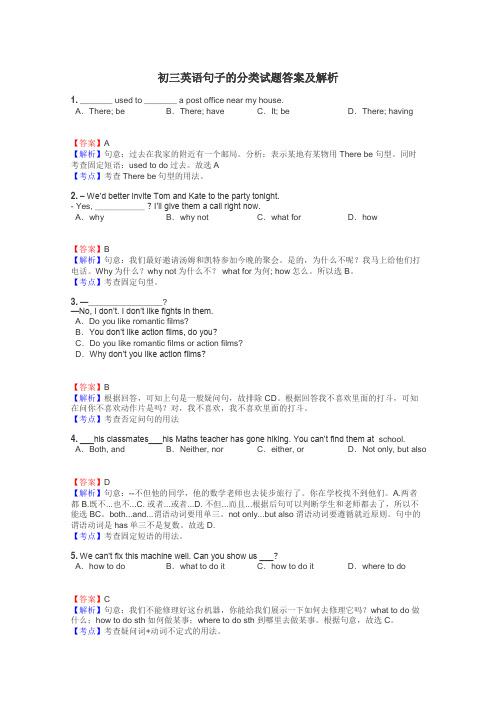
初三英语句子的分类试题答案及解析1. _______ used to _______ a post office near my house.A.There; be B.There; have C.It; be D.There; having【答案】A【解析】句意:过去在我家的附近有一个邮局。
分析:表示某地有某物用There be 句型。
同时考查固定短语:used to do过去。
故选A【考点】考查There be句型的用法。
2.–We’d better invite Tom and Kate to the party tonight.- Yes, ______? I’ll give them a call right now.A.why B.why not C.what for D.how【答案】B【解析】句意:我们最好邀请汤姆和凯特参加今晚的聚会。
是的,为什么不呢?我马上给他们打电话。
Why为什么?why not为什么不? what for为何; how怎么。
所以选 B。
【考点】考查固定句型。
3.—________________?—No, I don’t. I don’t like fights in them.A.Do you like romantic films?B.You don’t like action films, do you?C.Do you like romantic films or action films?D.Why don’t you like action films?【答案】B【解析】根据回答,可知上句是一般疑问句,故排除CD。
根据回答我不喜欢里面的打斗,可知在问你不喜欢动作片是吗?对,我不喜欢,我不喜欢里面的打斗。
【考点】考查否定问句的用法4.___his classmates___his Maths teacher has gone hiking. You can’t find them at school. A.Both, and B.Neither, nor C.either, or D.Not only, but also【答案】D【解析】句意:--不但他的同学,他的数学老师也去徒步旅行了。
中考英语专项复习句子种类

2 祈使句
表示请求,命令,劝告或建议的句子称为祈使句。句末用感叹号“!”或句号 “.”,读时一般用降调。
(1)祈使句的基本结构:动词原形(be或实义动词)+其它部分构成,动词没有人 称和时态的变化。 Close the door. Be sure to come on time. (2)祈使句的强调 ①祈使句主语是you时,you通常省略,但如果要特别强调向谁提出请求后命令,或 表达某种强烈的情绪时可以有主语或称呼语。
表“禁止做某事”。
No fishing! 禁止钓鱼!
No smoking! 禁止吸烟!
No parking! 禁止停车! NO PHOTOS! 禁止拍照!
(4)祈使句表委婉的方法
①加plese,可在句首或句末加please,但please加在句末时,前面必须用逗号与其余 部分分开。 Open the window, please. 请打开窗!Plese give me a hand. ②加will you(反意疑问句) Read the text,will you?读一下课文,好吗? ③p输 标l题e入a数s文字e等和本都w信可以i息l通l y过o点u击同和重时新输用入进行更改。文字 Do数n字’t大m小a颜k色e参n考o此is模e板,please,will you? ④用输入wo文u本ld信yo息u 更客气 Hu标rr题y数u字p等,都可w以o通u过ld点y击o和u重?新输入进行更改。文字
Be quiet. 安静! You be quiet for a monet你安静会! Parents with children go to the front,please.
②另一种祈使句表示强调的方法时在句首加do. Do come earlier next time
初中英语2024届中考语法复习非谓语动词专项练习(通用版)(附参考答案和解析)
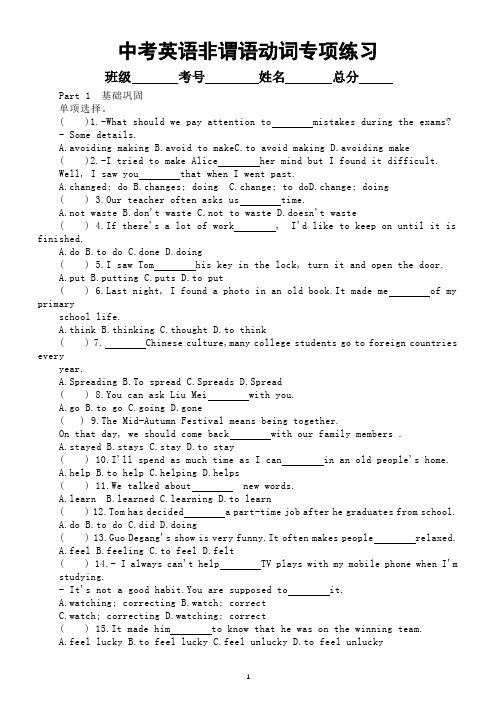
中考英语非谓语动词专项练习班级考号姓名总分Part 1 基础巩固单项选择。
( )1.-What should we pay attention to mistakes during the exams?- Some details.A.avoiding makingB.avoid to makeC.to avoid makingD.avoiding make( )2.-I tried to make Alice her mind but I found it difficult.Well, I saw you that when I went past.A.changed; doB.changes; doingC.change; to doD.change; doing( ) 3.Our teacher often asks us time.A.not wasteB.don't wasteC.not to wasteD.doesn't waste( ) 4.If there's a lot of work , I'd like to keep on until it is finished.A.doB.to doC.doneD.doing( ) 5.I saw Tom his key in the lock, turn it and open the door.A.putB.puttingC.putsD.to put( ) st night, I found a photo in an old book.It made me of my primaryschool life.A.thinkB.thinkingC.thoughtD.to think( ) 7. Chinese culture,many college students go to foreign countries everyyear.A.SpreadingB.To spreadC.SpreadsD.Spread( ) 8.You can ask Liu Mei with you.A.goB.to goC.goingD.gone( ) 9.The Mid-Autumn Festival means being together.On that day, we should come back with our family members .A.stayedB.staysC.stayD.to stay( ) 10.I'll spend as much time as I can in an old people's home.A.helpB.to helpC.helpingD.helps( ) 11.We talked about new words.A.learnB.learnedC.learningD.to learn( ) 12.Tom has decided a part-time job after he graduates from school.A.doB.to doC.didD.doing( ) 13.Guo Degang's show is very funny.It often makes people relaxed.A.feelB.feelingC.to feelD.felt( ) 14.- I always can't help TV plays with my mobile phone when I'm studying.- It's not a good habit.You are supposed to it.A.watching; correctingB.watch; correctC.watch; correctingD.watching; correct( ) 15.It made him to know that he was on the winning team.A.feel luckyB.to feel luckyC.feel unluckyD.to feel unluckyPart 2 难点突破一、单项选择。
初中英语2024年中考句子种类专项复习(考点清单精题精练)
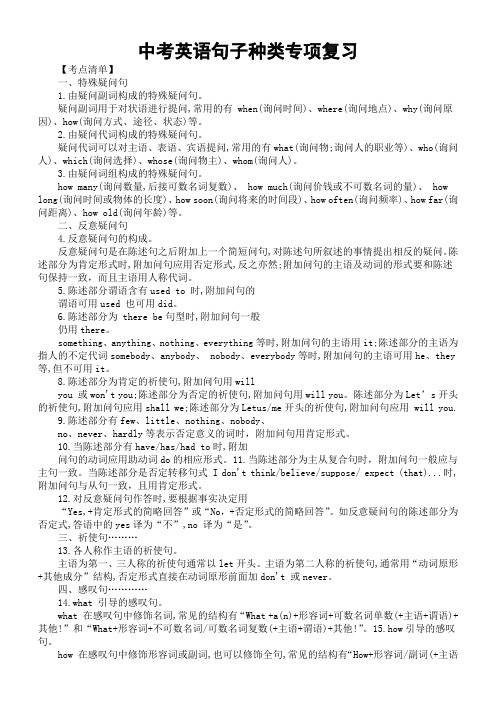
中考英语句子种类专项复习【考点清单】一、特殊疑问句1.由疑问副词构成的特殊疑问句。
疑问副词用于对状语进行提问,常用的有 when(询问时间)、where(询问地点)、why(询问原因)、how(询问方式、途径、状态)等。
2.由疑问代词构成的特殊疑问句。
疑问代词可以对主语、表语、宾语提问,常用的有what(询问物;询问人的职业等)、who(询问人)、which(询问选择)、whose(询问物主)、whom(询问人)。
3.由疑问词组构成的特殊疑问句。
how many(询问数量,后接可数名词复数)、 how much(询问价钱或不可数名词的量)、 how long(询问时间或物体的长度)、how soon(询问将来的时间段)、how often(询问频率)、how far(询问距离)、how old(询问年龄)等。
二、反意疑问句4.反意疑问句的构成。
反意疑问句是在陈述句之后附加上一个简短问句,对陈述句所叙述的事情提出相反的疑问。
陈述部分为肯定形式时,附加问句应用否定形式,反之亦然;附加问句的主语及动词的形式要和陈述句保持一致,而且主语用人称代词。
5.陈述部分谓语含有used to 时,附加问句的谓语可用used 也可用did。
6.陈述部分为 there be句型时,附加问句一般仍用there。
something、anything、nothing、everything等时,附加问句的主语用it;陈述部分的主语为指人的不定代词somebody、anybody、 nobody、everybody等时,附加问句的主语可用he、they 等,但不可用it。
8.陈述部分为肯定的祈使句,附加问句用willyou 或won't you;陈述部分为否定的祈使句,附加问句用will you。
陈述部分为Let’s开头的祈使句,附加问句应用shall we;陈述部分为Letus/me开头的祈使句,附加问句应用 will you.9.陈述部分有few、little、nothing、nobody、no、never、hardly等表示否定意义的词时,附加问句用肯定形式。
初中英语2024届中考复习句型转换专项练习(共100题,附参考答案和解析)
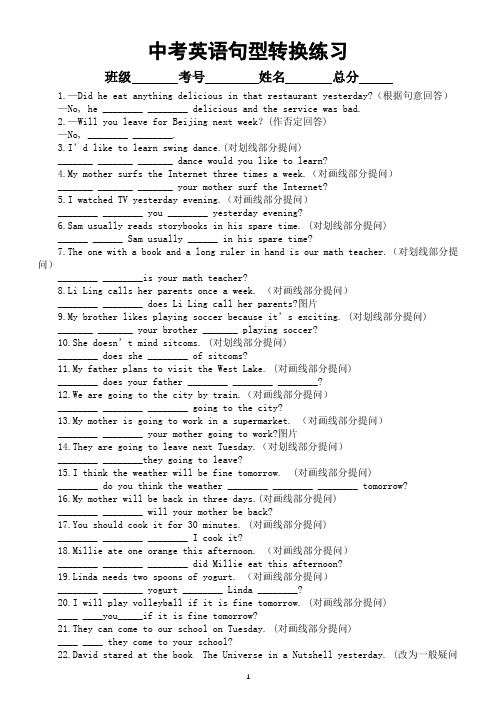
中考英语句型转换练习班级考号姓名总分1.—Did he eat anything delicious in that restaurant yesterday?(根据句意回答)—No, he ________ ________ delicious and the service was bad.2.—Will you leave for Beijing next week?(作否定回答)—No, ________ ________.3.I’d like to learn swing dance.(对划线部分提问)_______ _______ _______ dance would you like to learn?4.My mother surfs the Internet three times a week.(对画线部分提问)_______ _______ _______ your mother surf the Internet?5.I watched TV yesterday evening.(对画线部分提问)________ ________ you ________ yesterday evening?6.Sam usually reads storybooks in his spare time. (对划线部分提问)______ ______ Sam usually ______ in his spare time?7.The one with a book and a long ruler in hand is our math teacher.(对划线部分提问)________ ________is your math teacher?8.Li Ling calls her parents once a week. (对画线部分提问)________ ________ does Li Ling call her parents?图片9.My brother likes playing soccer because it’s exciting. (对划线部分提问)_______ _______ your brother _______ playing soccer?10.She doesn’t mind sitcoms. (对划线部分提问)________ does she ________ of sitcoms?11.My father plans to visit the West Lake. (对画线部分提问)________ does your father ________ ________ ________?12.We are going to the city by train.(对画线部分提问)________ ________ ________ going to the city?13.My mother is going to work in a supermarket. (对画线部分提问)________ ________ your mother going to work?图片14.They are going to leave next Tuesday.(对划线部分提问)________ ________they going to leave?15.I think the weather will be fine tomorrow. (对画线部分提问)________ do you think the weather ________ ________ ________ tomorrow?16.My mother will be back in three days.(对画线部分提问)________ ________ will your mother be back?17.You should cook it for 30 minutes. (对画线部分提问)________ ________ ________ I cook it?lie ate one orange this afternoon. (对画线部分提问)________ ________ ________ did Millie eat this afternoon?19.Linda needs two spoons of yogurt. (对画线部分提问)________ ________ yogurt ________ Linda ________?20.I will play volleyball if it is fine tomorrow. (对画线部分提问)____ ____you_____if it is fine tomorrow?21.They can come to our school on Tuesday. (对画线部分提问)____ ____ they come to your school?22.David stared at the book The Universe in a Nutshell yesterday. (改为一般疑问句)_________ David _________ at the book The Universe in a Nutshell yesterday?23.The teacher told us just now. The sun is bigger than the earth.(改为含宾语从句的复合句)The teacher ________ us just now that the sun ________ bigger than the earth.24.Li Ming is playing basketball now.(用often改写句子)Li Ming_______ _______basketball.25.They bought something special in the supermarket.(改为一般疑问句)________ they________ ________ special in the supermarket?26.James Harden seldom argues with his classmates.(改为反意疑问句)James Harden seldom argues with his classmates, __________ __________?27.She stayed there for a week.(改为否定句)She ________ ________ there for a week.28.He plays soccer and goes swimming on weekends.(改为否定句)He ______ ________ soccer ________ ________ swimming on weekends.29.Huang Lei likes sports , and Larry likes sports , too.(合并为一句)________ Huang Lei ________ Larry like sports .30.I like the city better than the country.(改为选择疑问句)__________ do you like __________, the city or the country?31.I think my dress is the same as Rita’s. (改为反义句)I think my dress is ________ ________ Rita’s.32.I have something to tell you. (改为一般疑问句)________ you have ________ to tell me?33.Your sister sent me a message on the mobile phone. (改为否定句)Your sister ________ ________ a message to me on the mobile phone.34.We visited the Palace Museum last weekend. (用next Sunday改写句子)We are ________ to ________ the Palace Museum next Sunday.35.I am going to make some dumplings tomorrow morning. (改为一般疑问句)________ you going to make ________ dumplings tomorrow morning?36.The work will be finished in two hours.(改为—般疑问句)________the work ________ ________ in two hours?37.Do you know? Will we hold an English party this term? (改为含宾语从句的复合句)Do you know ________ we ________ an English party this term?38.The Greens will go to Hainan Island for a vacation.(改为一般疑问句)________ ________ ________ ________ to Hainan Island for a vacation?39.I think there will be more pollution.(改为否定句)I ________ think there ________ be more pollution.40.The students of Class 2 will see the animals at the zoo this Sunday afternoon.(改为否定句)The students of Class 2________ ________ the animals at the zoo this Sunday afternoon.41.Will you please come here on time? (改祈使句)________ ______ on time, please.42.Bill put some fruit in the fridge just now. (改为否定句)Bill ________ ________ any fruit in the fridge just now.43.The food is very delicious. (改为感叹句)________ ________ the food is!44.You mustn’t smoke here. (改为祈使句)________ ________ here, please.45.Pour some water into the glass. (改为否定句)________ ________ ________ water into the glass.46.Put the bananas and the milk in the blender. (改为否定句)________ put the bananas ________ in the blender.47.The doctor often adivses us that we should be active in sports.(改为祈使句)“_______ _______ in sports.” the doctor often says to us.48.They are going to do more practice. They will win the match. (改为含有if条件句的复合句)______ they ______ more practice, they______ ______ the match.49.If you study hard, you’ll catch up with others. (改为并列句)____ ____, or you’ll fall behind others.50.Jane has to do her homework first.(改为否定句)Jane ________ ________ to do her homework first.51.Alice studied for a math test last night. (改为否定句)Alice ________ ________ for a math test last night.52.I can go to the zoo with you after lunch.(改为一般疑问句)________ ________ ________ to the zoo with me after lunch?53.Does Zhang Juan have to go to school now? (改为陈述句)Zhang Juan ____ ____ go to school now.54.They will go to Beijing on vacation next week. They will have enough time.(合并为含if的复合句)They will go to Beijing on vacation next week ________ they ________ enough time.55.If you wear jeans, we won’t let you in.(改为祈使句)________ ________ ________, or we won’t let you in.56.She will go to the cinema. It won’t snow tomorrow.(用if合并为一句)She ____ ____ to the cinema if it ____ ____ tomorrow.57.He asked me to go to Hefei with him. (改为否定句)He asked me ________ ________ ________ to Hefei with him.58.Please bring some masks to my house. (改为否定句)________ ________ any masks to my house please.59.The Muji(无印良品) pen cost me 99 yuan. (保持原句意思不变)I __________ 99 yuan __________ the Muji(无印良品) pen.60.Why don’ t you tell him the news?(改为同义句)________ ________ tell him the news?61.Dean didn't t say anything at the meeting.(改为同义句)Dean________ ________ at the meeting.62.To lie on the beach is relaxing. (变为同义句)______ ___________ to lie on the beach .63.Town Cinema is cheaper than any other cinema in our town .(变为同义句)Town Cinema is______ ___________ in our town .图片64.What do you think of the 2018 Spring Festival Gala?(变为同义句)______ do you ______ the 2018 Spring Festival Gala?65.It is about 15 minutes’walk from here to school.(变为同义句)It is about 15 ______ ______ ______ from here to school.66.This book is not as interesting as that one. (保持句意基本不变)This book is _______ interesting _______ that one.67.The baby sleeps over ten hours a day. (改为同义句)The baby sleeps ______ ______ ten hours a day.68.English isn’t as easy as history.(改为同义句)English is ___________ ___________ ________ history.69.They both study very hard.(改为同义句)__________ __________ them study very hard.70.Lily sings better than Lucy. (改为同义句)Lucy ____________ sing ____________ well as Lily.71.I’m 13 years old, and she is 13 years old, too.(改为同义句)We ________ ________ 13 years old.72.Jim is 13 and Mike is 17. (改为同义句)Mike is 4 years ________ ________ Jim.73.Lin Hui asked me, “Do you help your parents with the housework?”(改为同义句)Lin Hui asked me ____I ____ my parents with the housework.74.Miss Li is popular in our class. Mr. Wang is more popular. (同义句转换)Mr. Wang is __________ popular __________ Miss Li.75.My painting isn’t as beautiful as Millie’s. (改为同义句)My painting is ________ ________ than Millie’s.76.This hotel’s service is friendlier than any other Hotel in town. (改为同义句)This hotel’s service is ________ ________ in town.77.Tina works harder than any other student in her class. (改为同义句)Tina ________ ________ in her class.78.Tom is the most popular student in our class. (改为同义句)Tom is ________ popular ________ any other student in our class.79.Shanghai is the biggest city in China. (改为同义句)Shanghai is bigger ________ ________ other city in China.80.My favorite song is My Dream.(改为同义句)I ____ the song My Dream ____.81.Mike hopes he can visit the Great Wall one day. (同义句转换)Mike hopes ________ ________ the Great Wall one day.82.They decided to go to Australia for their holiday. (改为同义句)They decided ________ _________ _________ a holiday _________ Australia.83.I went to the forest alone because I didn’t want others to know it. (改为同义句)I went to the forest alone because I wanted to ________ ________ _________.84.What do you think of action movies?(改为同义句)________________ ________________ ________________ ________________ action movies?85.I hope to find a good job some day. (改为同义句)I ________________ that ________________ ________________ ________________ a good job some day.86.They may not be very excited. (改为同义句)图片________________ they ________________ ________________ very excited.87.Do you want to watch the news?(改为同义句)________________ you ________________ to watch the news?88.Our class is going to have an English party today. (改为同义句)There ________ ________ ________ ________ an English party in our class today.89.The question is so difficult that we can’t answer it. (改为同义句)The question is ________ difficult for us ________ answer.90.She could play the piano when she was five years old.(改为同义句)She ________ ________ ________ play the piano at the age of five.91.I have more apples than Lily.(改为同义句)图片Lily ________ ________ apples than I.92.It will rain in Nanjing tomorrow.(改为同义句)________ ________ ________ rain in Nanjing tomorrow.93.Here is much bread for all of you. (改为同义句)Here is ________ ________ bread for all of you.94.Don’t bring friends from other schools, or the teachers will ask them to leave. (改为同义句)____ ____ bring friends from other schools, the teachers will ask them to leave.95.Will you be free this afternoon?(改为同义句)Will you ________ ________ this afternoon?96.Mr. Smith will leave for Wuhan the day after tomorrow. (改为同义句)Mr. Smith ________ ________ for Wuhan the day after tomorrow.97.After he finished his homework, he watched TV.(改为同义句)He ________ watch TV ________ he finished his homework.98.Do you have time next Tuesday, Karl? (改为同义句)____ you ____ next Tuesday, Karl?99.The students stood there and didn’t know what they should do next. (改为同义句)The students stood there and didn’t know___ ___ ___ next.100.Suzy didn’t’ know when she would take boat trip on the lake.(保持句意基本不变)Suzy didn’t know ________ ________ take a boat trip on the lake.附:参考答案和解析1.ate nothing【详解】句意:——昨天他在那家餐馆吃了什么好吃的东西吗?he是主语,后接动词作谓语,根据问句“Did he eat anything delicious in that restaurant yesterday?”以及答句中的No,可知,这里表示“他什么美味的东西都没吃”,句子使用一般过去时。
2025初中英语中考总复习完成句子专项练习100题附答案及解析
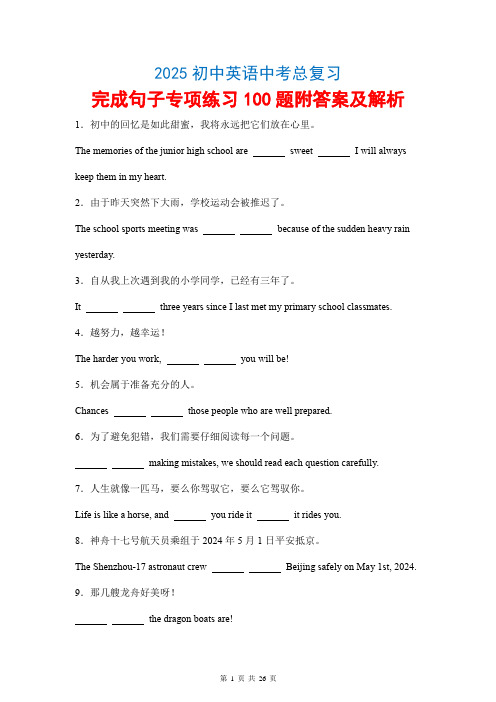
2025初中英语中考总复习完成句子专项练习100题附答案及解析1.初中的回忆是如此甜蜜,我将永远把它们放在心里。
The memories of the junior high school are sweet I will always keep them in my heart.2.由于昨天突然下大雨,学校运动会被推迟了。
The school sports meeting was because of the sudden heavy rain yesterday.3.自从我上次遇到我的小学同学,已经有三年了。
It three years since I last met my primary school classmates. 4.越努力,越幸运!The harder you work, you will be!5.机会属于准备充分的人。
Chances those people who are well prepared.6.为了避免犯错,我们需要仔细阅读每一个问题。
making mistakes, we should read each question carefully.7.人生就像一匹马,要么你驾驭它,要么它驾驭你。
Life is like a horse, and you ride it it rides you.8.神舟十七号航天员乘组于2024年5月1日平安抵京。
The Shenzhou-17 astronaut crew Beijing safely on May 1st, 2024. 9.那几艘龙舟好美呀!the dragon boats are!10.木兰女扮男装,替父从军。
Mulan dressed up like a boy and her father’s to fight in the army.11.他的父母为他的进步深感骄傲。
His parents are very his progress.12.他更喜欢走路上学,因为那是好的锻炼方式。
初中英语2024届中考复习语法知识讲解(词性+句子成分+句子划分+简单句结构)
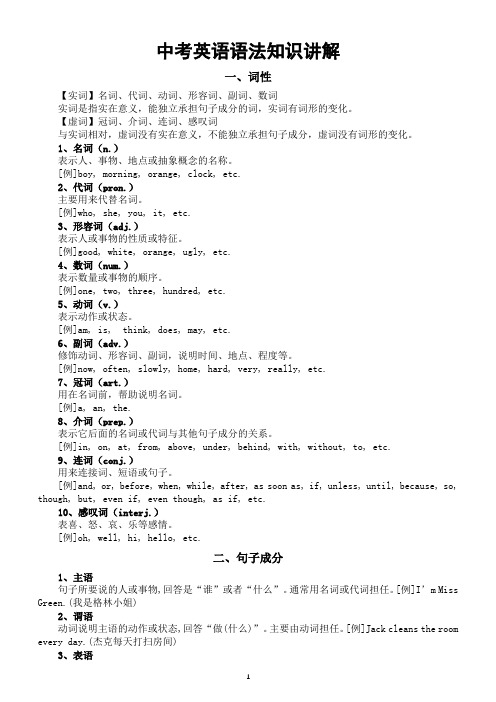
中考英语语法知识讲解一、词性【实词】名词、代词、动词、形容词、副词、数词实词是指实在意义,能独立承担句子成分的词,实词有词形的变化。
【虚词】冠词、介词、连词、感叹词与实词相对,虚词没有实在意义,不能独立承担句子成分,虚词没有词形的变化。
1、名词(n.)表示人、事物、地点或抽象概念的名称。
[例]boy, morning, orange, clock, etc.2、代词(pron.)主要用来代替名词。
[例]who, she, you, it, etc.3、形容词(adj.)表示人或事物的性质或特征。
[例]good, white, orange, ugly, etc.4、数词(num.)表示数量或事物的顺序。
[例]one, two, three, hundred, etc.5、动词(v.)表示动作或状态。
[例]am, is, think, does, may, etc.6、副词(adv.)修饰动词、形容词、副词,说明时间、地点、程度等。
[例]now, often, slowly, home, hard, very, really, etc.7、冠词(art.)用在名词前,帮助说明名词。
[例]a, an, the.8、介词(prep.)表示它后面的名词或代词与其他句子成分的关系。
[例]in, on, at, from, above, under, behind, with, without, to, etc.9、连词(conj.)用来连接词、短语或句子。
[例]and, or, before, when, while, after, as soon as, if, unless, until, because, so, though, but, even if, even though, as if, etc.10、感叹词(interj.)表喜、怒、哀、乐等感情。
[例]oh, well, hi, hello, etc.二、句子成分1、主语句子所要说的人或事物,回答是“谁”或者“什么”。
2024年中考英语复习模拟精练与真题演练—动词和动词短语(含解析)
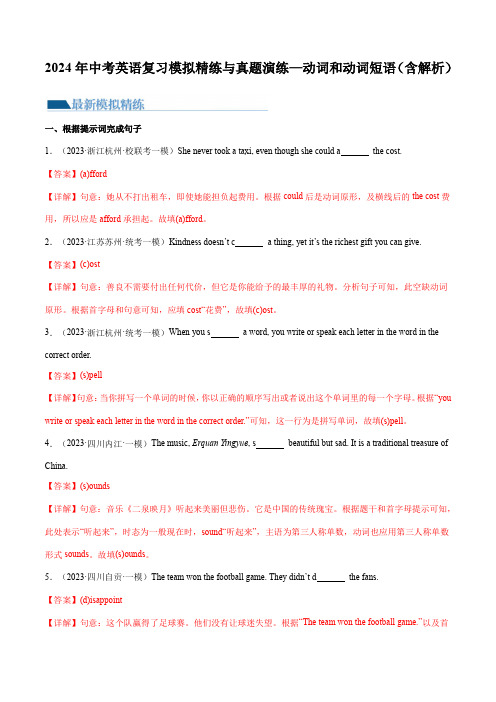
2024年中考英语复习模拟精练与真题演练—动词和动词短语(含解析)一、根据提示词完成句子1.(2023·浙江杭州·校联考一模)She never took a taxi, even though she could a the cost.【答案】(a)fford【详解】句意:她从不打出租车,即使她能担负起费用。
根据could后是动词原形,及横线后的the cost费用,所以应是afford承担起。
故填(a)fford。
2.(2023·江苏苏州·统考一模)Kindness doesn’t c a thing, yet it’s the richest gift you can give.【答案】(c)ost【详解】句意:善良不需要付出任何代价,但它是你能给予的最丰厚的礼物。
分析句子可知,此空缺动词原形。
根据首字母和句意可知,应填cost“花费”,故填(c)ost。
3.(2023·浙江杭州·统考一模)When you s a word, you write or speak each letter in the word in the correct order.【答案】(s)pell【详解】句意:当你拼写一个单词的时候,你以正确的顺序写出或者说出这个单词里的每一个字母。
根据“you write or speak each letter in the word in the correct order.”可知,这一行为是拼写单词,故填(s)pell。
4.(2023·四川内江·一模)The music, Erquan Yingyue, s beautiful but sad. It is a traditional treasure of China.【答案】(s)ounds【详解】句意:音乐《二泉映月》听起来美丽但悲伤。
- 1、下载文档前请自行甄别文档内容的完整性,平台不提供额外的编辑、内容补充、找答案等附加服务。
- 2、"仅部分预览"的文档,不可在线预览部分如存在完整性等问题,可反馈申请退款(可完整预览的文档不适用该条件!)。
- 3、如文档侵犯您的权益,请联系客服反馈,我们会尽快为您处理(人工客服工作时间:9:00-18:30)。
中考初中英语句子种类专项复习及解析考点知识精讲按用途分,句子可分为四种:陈述句、疑问句、祈使句和感叹句。
考点一陈述句陈述句用来说明一个事实或陈述说话人的看法。
陈述句分为肯定式和否定式两种,句末用句号,读时用降调,有五种基本句型。
1.陈述句的肯定式的形式(1)主语+系动词+表语We are happy. 我们很快乐。
注:系动词有三类,具体如下:①表状态:be, seem, appear(显得),go(变成), stand(坐落),stay(保持), lie(位于), keep(保持)②表感官:look(看上去), sound(听起来),smell(闻起来), feel(感觉), taste(尝起来)③表变化:get(变得),become(成为), turn(变成),grow(渐渐变成),come(成为)(2)主语+不及物动词They are reading. 他们在看书。
(3)主语+及物动词+宾语I teach English.我教英语。
(4)主语+及物动词+间接宾语+直接宾语直接宾语表物,间接宾语表人。
一些间接宾语可改成一个由to引导的短语(强调动作是“向谁”做的),或由for 引导的短语(强调动作是“为谁”做的)。
He gave me a book.=He gave a book to me. 他给我一本书。
能带双宾语的动词中多数在间接宾语前加to,这样的动词有:give(给),pass(传、递),take(拿去),bring (带来),show(出示、展现),lend (借给),sell(出售)等。
带双宾语的动词在间接宾语前加for的动词有:buy(购买), make(制作/造), build(建造), mend (修理),cook(烹饪)等。
My mother bought me a present.=My mother bought a present for me.我妈妈给我买了件礼物。
(5)主语+及物动词+宾语+宾补You'd better tell the students not to make so much noise.你最好告诉学生们不要这么大声吵闹。
①带to的不定式作宾补的动词有:tell,ask,order,want等。
②省略to的不定式作宾补的动词有:feel,hear,see,notice,have/make/let等。
2.否定句(1)含be动词、助动词、情态动词的否定。
如果句子的谓语动词是be, have、助动词或情态动词,在它们之后加not 构成否定句。
Tom can't swim.汤姆不会游泳。
(2)行为动词的否定。
如果句子的动词是行为动词而又没有助动词或情态动词,在谓语前加do的相应形式后再加not。
They didn't want to take pictures.他们不想拍照片。
(3)还可用nothing等否定代词,no等否定形容词和little, few, hardly等半否定词与肯定形式的谓语动词连用来表示否定。
I can hardly understand what you said.我几乎听不明白你说的。
(4)在“I think/believe+that 从句”的句型中,若想否定从句动词的含义,必须采用否定主句动词think的形式,这叫否定的转移。
We/I don't think it's true. 我们/我认为那不是真的。
考点二疑问句疑问句用于提出问题。
句末用问号(?),可分为四种:一般疑问句、选择疑问句、反意疑问句和特殊疑问句。
1.一般疑问句是可用Yes 或No 来回答的问句。
它总是以be(is,am,are,was,were),have(has,had),情态动词或助动词开头。
有时也可用“Not at all”,“Certainly”等回答。
—Would you like some more? 你想再来一些吗?—No,thanks. I'm full. 不,谢谢。
我饱了。
2.选择疑问句的结构有两种:(1)以一般疑问句为基础,用or 来连接不同的选择对象;(2)以特殊疑问句为基础,在其后用or来连接不同的选择对象。
Shall we go to see you or will you come to see us?是我们去看你们,还是你们来看我们?Which would you like better, tea or milk?你喜欢喝哪个,茶还是牛奶?3.反意疑问句是提出情况或看法,问对方是否同意的句子。
一般由两部分组成:“陈述句+简略问句?”这两部分的肯定与否定形式正好相反,即:①“肯定的陈述句+否定的简略问句?”②“否定的陈述句+肯定的简略问句?”(1)反意疑问句主语及谓语的确定。
反意疑问句主语与谓语的确定应以陈述部分的主语和谓语为依据,尤其是要注意一些特殊的情况,同时,简略问句部分的主语一般应用人称代词,而动词若为否定形式则一般应用缩略形式。
①陈述部分含有never,few,little,nothing,nobody,no,hardly,none,too...to...等表示否定意义的词时,其附加问句应用肯定形式。
但否定意义的词是careless,dislike等含否定词缀的派生词时,仍按肯定句对待,后边的简略问句用否定形式。
There are few people in the room, are there?房间里几乎没有人,是吗?②陈述句部分是“there be”结构时,疑问部分用“be there”。
There is a tree in front of the building, isn't there?楼前面有一棵树,是吗?③当陈述部分的主语为指事(物)的不定代词something,anything,everything等时,附加问句的主语应用it。
Something is wrong with your computer,isn't it?你的电脑出毛病了,是吗?④当陈述部分的主语为指人的不定代词somebody,anybody,everybody等时,附加问句的主语可用he强调个体或they强调全部,但不可用it 来代替。
Somebody wants to see you, doesn't he?有人要见你,是吗?⑤当陈述部分的主语为this, that 等时,附加部分的主语应用it。
类似地,当陈述部分的主语为these,those 等时,附加部分的主语应用they。
This is a beautiful picture, isn't it?这是一幅美丽的图画,是吗?Those aren't apple trees, are they?那些不是苹果树,是吗?⑥当陈述部分动词为have(has)时有下列几种情况:Ⅰ. have在一般现在时中表示“有”之意,附加问句的谓语可用have,也可用助动词do。
Tom has a new watch, doesn't he (hasn't he)? 汤姆有块新表,是吗?Ⅱ.have to 表示“不得不”“必须”之意时,附加问句的谓语应用助动词do。
Kate has to help her mother at home, doesn't she? 凯特不得不在家帮她妈妈,是吗?Ⅲ.have表示“吃、喝、玩、度过”等意思时,其附加问句的谓语应用助动词do。
They have a good time in Beijing, don't they ? 他们在北京玩得很愉快,是吗?Ⅳ.had better表示“最好”之意,当其用在陈述部分时,附加问句的谓语动词应用had。
We'd better stop talking, hadn't we? 我们最好停止说话,好吗?Ⅴ.have 用在完成时中,其附加问句的谓语动词应用have。
Lucy has ever been to Japan, hasn't she? 露西曾经去过日本,是吗?⑦当陈述部分含有need时,如果need用作行为动词,则附加问句的动词应用do;如果need用作情态动词,则附加问句的动词应用need。
We need to arrive in Shanghai at 7:00, don't we? 我们需要在七点到达上海,是吗?We needn't leave at once, need we? 我们不必马上离开,是吗?⑧当陈述部分含有情态动词must时,有下列几种情况:Ⅰ.must 表示“必须”之意,附加问句的谓语用needn't。
They must come on time, needn't they?他们必须准时到,是吗?Ⅱ.must表示推测,意为“一定,想必”,附加问句的谓语动词的确定应根据must后面的动词。
如:That man must be Mr Wang, isn't he? 那个人想必是王先生,是吗?⑨当陈述部分为I (am)形式时,附加问句部分应该用aren't I。
如:I'm right, aren't I?我是对的,是吗?⑩陈述句部分若为主从复合句,疑问部分的主语通常与主句的主语一致。
如:She said he would come tomorrow,didn't she?她说他明天会来,是吗?注:若主句的主语是第一人称I/we,其谓语动词又是think,suppose,expect,believe,imagine等,疑问部分的主语一般与从句的主语一致。
(应特别注意否定的转移)I think he is a good student,isn't he? 我认为他是一个好学生,是吗?We don't think you are right, are you? 我们认为你不对,是吗?(2)反意疑问句的答语。
反意疑问句作回答时,如果答案肯定则用yes,后跟肯定形式的简略回答方式;若答案否定则用no,后跟否定形式的简略回答方式。
即其回答与一般疑问句的回答方式完全一致。
特别注意有时要根据具体的语境来确定回答应为肯定形式还是否定形式。
—Lucy skates very well, doesn't she? 露西滑冰非常好,是吗?—Yes, she does. 是的,她是。
②—You don't like the man, do you? 你不喜欢这个人,是吗?—No,I don't. 是的,我不喜欢。
4.特殊疑问句是以疑问词引出的问句。
